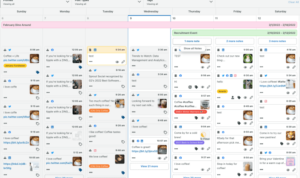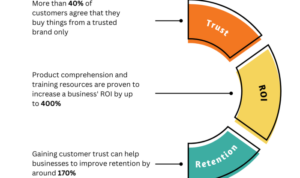Referral Marketing Ideas takes center stage in the world of business promotions, offering innovative ways to boost your brand. From unique strategies to enticing rewards, this guide will show you how to make the most of referral marketing.
Types of Referral Marketing Programs

Referral marketing programs come in various forms, each with its unique approach to incentivizing customers to refer others. Let’s explore some of the most common types used by businesses:
Referral Discounts
Referral discounts are a popular type of referral program where existing customers receive discounts or rewards for referring new customers. For example, clothing brand Everlane offers $25 credit to both the referrer and referee when a new customer makes a purchase.
Loyalty Points Program
Loyalty points programs reward customers with points for each successful referral, which can be redeemed for discounts, free products, or other perks. Sephora’s Beauty Insider program allows members to earn points for referring friends, which can be used to redeem exclusive beauty products.
Cash Rewards
Cash rewards programs offer monetary incentives to customers for referring others. For instance, ride-sharing service Uber provides cash rewards to existing users when they refer new riders who complete a certain number of trips.
Product Giveaways
Product giveaways are another effective referral marketing strategy where customers receive free products or exclusive gifts for referring friends. Dropbox famously used this tactic by offering extra storage space to users who referred new customers.
Each type of referral program has its benefits, such as increasing customer loyalty, expanding customer base, and driving sales growth. By leveraging these different approaches, businesses can tap into the power of word-of-mouth marketing and turn their loyal customers into brand advocates.
Creative Referral Marketing Ideas
Referral marketing doesn’t have to be boring! Here are some creative and unique ideas to help businesses stand out and maximize their referral program’s success.
Gamification in Referral Programs
Incorporating gamification into referral programs can make the process more engaging and rewarding for customers. Businesses can create fun challenges, competitions, or reward systems that incentivize customers to refer their friends and family. By adding a competitive element or offering exclusive prizes, businesses can increase participation and drive more referrals.
Social Media Influencers in Referral Marketing
Harnessing the power of social media influencers can take referral marketing to the next level. Businesses can partner with popular influencers in their niche to promote their referral program to a wider audience. Influencers can create authentic and compelling content that encourages their followers to sign up or make a purchase, resulting in a higher conversion rate for referral leads. By leveraging the reach and influence of social media personalities, businesses can tap into new markets and grow their customer base exponentially.
Incentives and Rewards

When it comes to referral marketing, offering attractive incentives and rewards is crucial in motivating customers to refer your business to others. People are more likely to take action when they know there is something valuable in it for them. Incentives can range from discounts and cash rewards to exclusive access to products or services.
Effective Referral Rewards
- Discounts: Offering a percentage off on a future purchase for both the referrer and the new customer can be a simple yet effective incentive.
- Cash Rewards: Providing cash incentives or gift cards for successful referrals can be a powerful motivator for customers to spread the word about your business.
- Free Products or Services: Giving away free products or services to both the referrer and the new customer can create excitement and encourage more referrals.
- Exclusive Access: Providing exclusive access to new products, services, or events can make customers feel special and motivated to refer others.
Tailoring Incentives to Target Audience
It’s important to consider the demographics of your target audience when designing referral incentives. Different groups may be motivated by different types of rewards. For example:
- Millennials: Younger customers may be more interested in unique experiences or exclusive access to events.
- Parents: Offering family-friendly rewards such as discounts on kid-friendly products or services can appeal to parents.
- Business Professionals: Providing rewards that save time or enhance productivity, such as a free trial of a premium service, can be enticing for this group.
Measuring Referral Marketing Success: Referral Marketing Ideas
Referral marketing success can be measured through various key performance indicators (KPIs) that help track the effectiveness of a referral program. By analyzing these metrics, businesses can optimize their referral programs for better results.
Key Performance Indicators (KPIs)
- Conversion Rate: Measure the percentage of referral leads that convert into actual customers. A higher conversion rate indicates the referral program’s success in generating quality leads.
- Customer Lifetime Value (CLV): Evaluate the long-term value of customers acquired through referrals. A higher CLV from referral customers signifies the program’s impact on customer retention and loyalty.
- Referral Traffic: Monitor the amount of website traffic driven by referral links. Increased referral traffic shows the program’s ability to attract new visitors to the website.
Tools and Methods for Analysis
- Referral Tracking Software: Utilize specialized tools to track referrals, monitor performance, and analyze data to measure the success of the program.
- Google Analytics: Use this tool to track referral traffic, conversion rates, and other relevant metrics to assess the effectiveness of referral campaigns.
- Surveys and Feedback: Gather feedback from referred customers to understand their experience and satisfaction levels, helping to evaluate the program’s impact.
Optimizing Referral Programs, Referral Marketing Ideas
- A/B Testing: Experiment with different referral strategies to identify the most effective approach and optimize program performance based on the results.
- Incentive Adjustments: Modify referral incentives based on performance metrics to incentivize more referrals and improve overall program success.
- Continuous Monitoring: Regularly monitor KPIs and performance metrics to identify areas for improvement and make necessary adjustments to enhance the referral program’s effectiveness.












